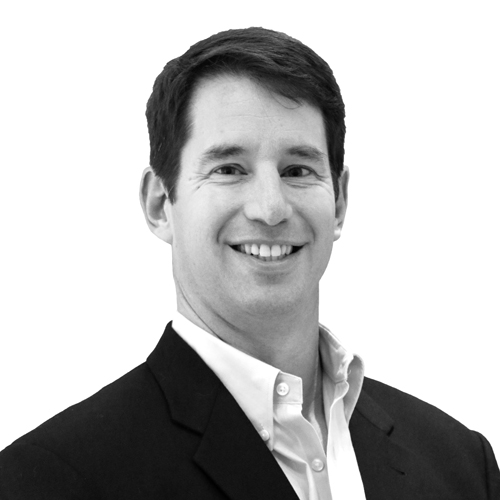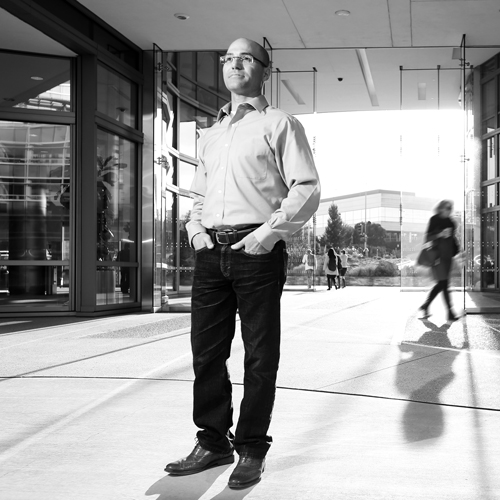THEN: Haj Tada’s decision to go to law school was driven in large part by curiosity. He had graduated from Yale with a liberal arts degree that taught him to pay close attention to the world around him, but he was unsure what he wanted to do within that world. He became fascinated by the position of law at the nexus of the news. “It seemed like everything had to deal with a legal or criminal or statutory issue,” he says. “I wanted to know more about this theme.” Antitrust law interested him from an academic standpoint. “It’s a fascinating American phenomenon of trying to codify free competition. It’s a uniquely American subject matter.” When he graduated from New York University Law, he followed that interest to San Francisco, a hub of antitrust practice. There, he found his first legal job at McCutchen Doyle Brown & Emerson, which specialized in antitrust law.
NOW: Tada has been following these interests for more than 25 years, and while no one could describe his career as linear, Tada says those instincts have kept it engaging and challenging. “I’ve had the pleasure of working in three very different environments, and I’ve had an immensely fun time practicing law. I’ve learned a lot of things at each stop. At the end of the process, I think I’m a pretty well-rounded lawyer.” The eclectic path he’s followed has landed him at Agilent, where, he says, one of the perks is never being bored.
THEN: At McCutchen, Tada handled civil and criminal antitrust cases for a variety of clients from the construction, health-care, oil, newspaper, and insurance industries. Being an effective antitrust lawyer requires knowing a client’s business inside and out; attorneys need to be able to come at a case from all angles and understand the realities and nuances that will give clients an edge. At McCutchen, Tada learned about working for multiple clients while honing in on each one’s specialized needs. “It spoke to the dilettante in me that I got to learn about a wide variety of industries,” he says.
NOW: At Agilent, that ability to dive into unfamiliar waters headfirst comes in handy. The high-tech focus of the company is different than anything Tada worked with in the past, but the thorough, fast-paced work the company requires isn’t new. He started at Agilent as a commercial attorney, and after a few years, he returned to litigation and oversaw all company litigation matters. Today, he wears a few professional hats: he is the lead legal liaison for Agilent’s largest business division and is a member of the division president’s senior staff. He’s also responsible for commercial matters in the Americas and manages a 20-person team. What has kept him at Agilent for 14 years, he says, is that the evolution of his role at the company keeps things interesting and allows him to engage in new areas of the business.
THEN: After six years at McCutchen, Tada took a position with the San Francisco city attorney’s office. Despite his extensive litigation work, few of the cases Tada worked on at McCutchen went to trial. “I felt that a big piece of my learning curve was missing,” he says. When he joined the office’s trial lawyer team, he was immediately handed a load of 75 cases to sort through and manage with one paralegal. “It was eye-opening to be thrown into the deep end and very quickly have to learn how to go through each case, cut to the chase, and figure out how to prioritize,” says Tada. Learning to balance multiple interests was crucial. Tada dealt with entities ranging from the mayor’s office to the police department, learning to deal with high-level clients with specialized needs.
NOW: With 12,000 employees, Agilent presents its own coordination challenges. A year and a half ago, Agilent announced it was spinning off its electronic measurement business, Keysight, which would require an intensive effort to reexamine and coordinate everything from customer contracts to human resources issues to real estate questions. That’s not to mention the typical workload Tada’s team had to keep up with. “You can’t underestimate how much time and effort was involved,” he says of the company split. “It literally felt like there were a million things to do.” Tada’s ability to navigate myriad clients has served him in working with the president of the largest division and company
representatives across the continent.
THEN: In addition to learning how to prioritize and manage cases quickly and effectively, Tada says one of the most important things he learned in San Francisco was how to work in a transparent political environment. “Like litigating in a political fishbowl,” he says, “every legal decision was, in a sense, a public, PR-related decision,”—a nuance that every lawyer in the office needed to understand. Tada joined the team around the time that the office was suing tobacco companies, and he participated in a multi-billion-dollar recovery. That money helped rebuild one of San Francisco’s major hospitals.
NOW: At Agilent, that public component has stayed relevant for him. “When you’re dealing with a public company, you’re very much beholden to shareholders. It’s still a public arena, and you have to be sensitive to how legal matters will appear to the public.” A company’s legal decisions, much like a city’s, affect the way the public views it, and, sometimes, its clients. When counseling Agilent, Tada takes to heart the company’s mission: “We enable our customers to make breakthroughs, to make real medical advances, and to cure disease at the genetic level,” he says. “I take pride in supporting a company that supports customers who make the world a healthier place.”


